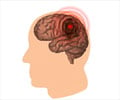Scientists have found that the body comprises a cellular First Aid system for brain cells in which certain immune cells in the blood, called regulatory T lymphocytes (Treg), inhibit
Scientists have found that the body comprises a cellular "First Aid" system for brain cells in which certain immune cells in the blood, called regulatory T lymphocytes (Treg), inhibit ischemic stroke-related inflammation.
Dr. Roland Veltkamp, senior physician at the Neurology Clinic of Heidelberg University Hospital, points out that the regulator cytokine interleukin 10 (IL 10) plays an important role in this protection, and that this work offers a new approach to stroke therapy.The lead researcher revealed that the study showed that a stroke in mice with no functioning Treg cells in their blood caused much greater damage to the brain and greater disabilities than in the animals with functioning Treg cells.
After analysing the immune system, the researchers showed that the mice without this cellular "First Aid" produced much more inflammatory transmitters in the brain and blood.
Also, the immune cells that recognise and digest foreign bodies or dead cell material - e.g. microglial cells or neutrophils - were activated more strongly in the absence of Treg.
Treg cells protect cells by suppressing the harmful activation of the immune system, and can thus also prevent autoimmune diseases from developing.
When the scientists injected IL 10 in mice with no functioning Treg cells on the first day after a stroke, they were found to have markedly less brain damage than mice that did not receive IL 10.
Advertisement
Now, the researchers are working on different approaches for translating the protective mechanisms of Treg into future treatment for strokes.
Advertisement
The study has been published in Nature Medicine.
Source-ANI
SRM















